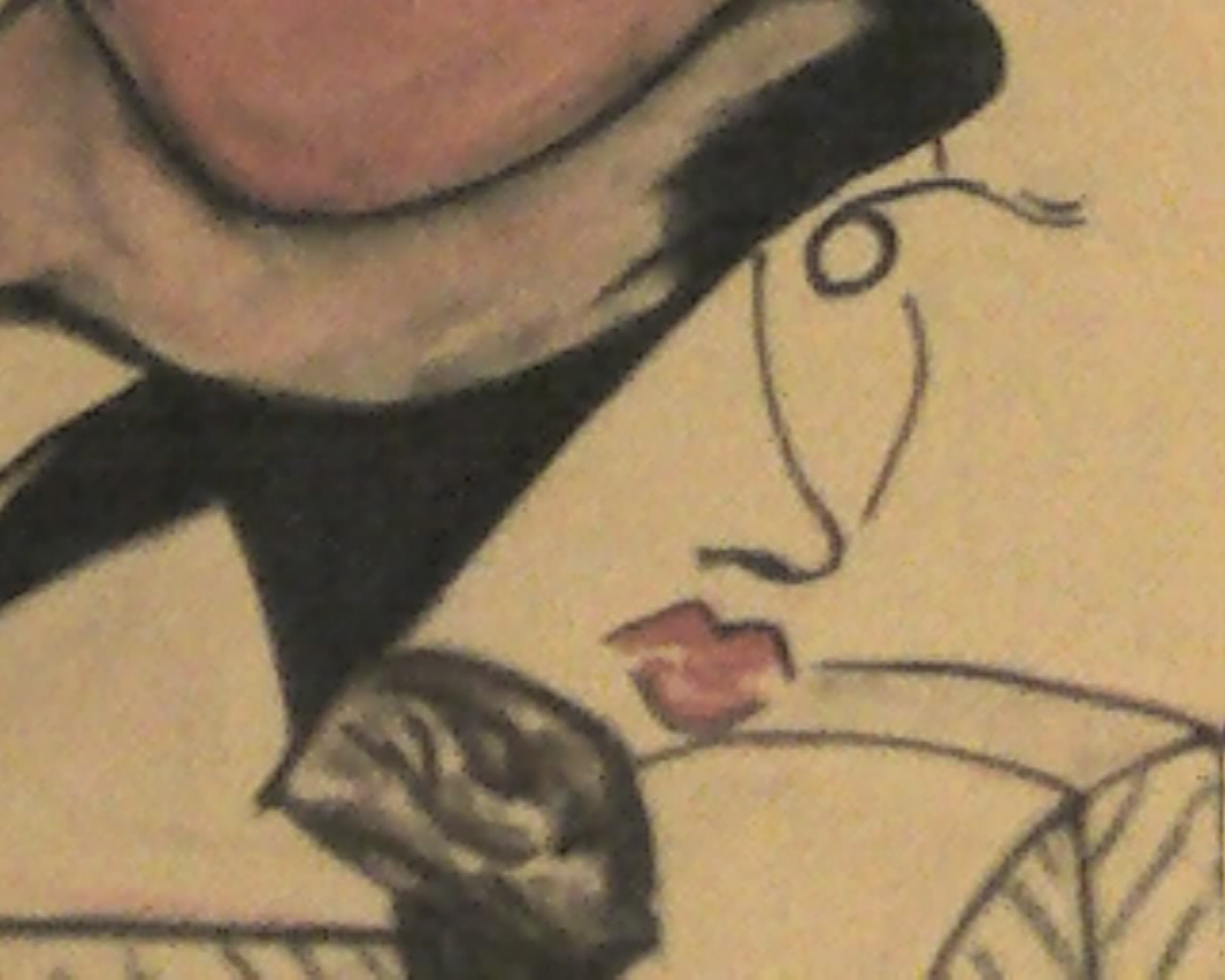29 de Abril 2007
Nuria
Esta es mi hermana Nuria con mi perro Bosco.
No sé si perciben ustedes cierto detalle en la fotografía...

por si no lo notaron en la anterior...
 Escrito por Artemisa a las 4:36 AM
| Comentarios (1)
Escrito por Artemisa a las 4:36 AM
| Comentarios (1)
25 de Abril 2007
diálogo para un duelo interno
- Creí que era lo que debía pasar.
- Lo provocaste.
- Lo creía inevitable, sí
- Lo propiciaste.
- Sí. Él pareció aliviado.
- ¿Disfrutabais juntos?
- Sí, a veces.
- A veces...
- Yo ya sabía que tenía demasiadas cosas que solucionar.
- Bloqueos, barreras, melancolías.
- Sí, cosas que arreglar conmigo.
- Las desplazaste.
- Sí, las desplacé a cosas que arreglar con él.
- Creabas problemas.
- Tenía problemas, sí.
- Por eso lo provocaste.
- No quería agotarle.
- Fuiste sincera.
- En lo que pude, él no se daba cuenta.
- ¿No sabía lo que te pasaba?
- Lo olvidó, y yo olvidé recordárnoslo.
- Él querría ayudarte.
- Sí. Supongo que no sabía.
- No lo pones fácil, quizá.
- No, no me lo pongo fácil.
- Querrás ponértelo fácil.
- Sí, y a los demás.
- ¿y ahora?
- Ahora, ha sido decepcionante.
- Para ti.
- Para los dos.
- Pasa cuando se rompe una relación.
- También ha sido decepcionante la propia ruptura.
- Queríais que estuviera todo bien.
- Sí, manener el contacto, llevarnos bien, tratarnos
- Y no es así...
- No, quiero hablar más con él, a veces quiero ir a verle.
- Y él no...
- Quiere que nos tratemos, con distancia, y no me llama como antes.
- Y tú...
- Le llamé un par de veces seguidas.
- Y no iba bien...
- Iba demasiado bien.
- Y eso no era bueno...
- Para mí no, me sentía abandonada, defraudada.
- ¿Porque iba bien?
- Porque luego pensaba cosas.
- De lo que querías que pasara...
- Y de lo que había pasado...
- En la relación...
- que antes me llamaba sólo porque "tenía que hacerlo",
que se había rendido porque soy un caso perdido,
que mintió al decir que me quería, que, que... lo típico.
- Quizá pedías mucho...
- Puede ser...
también me preguntaba si no debí evitar que empezara todo,
por mi cabeza loca. Quería arrepentirme.
- Creíste que sería positivo...
- Creí que él podría ayudarme con ello.
- Y no fue así...
- Me sentía cargante, hiperreactiva, complicada, absurda.
- Ponías en práctica lo que aprendías con la psico...
- Sí, comunicación eficaz, hacer críticas, respiración sos...
- Y ayudaban...
- Ayudaban. Discutíamos, igualmente. Me sentía fracasada.
- Discutir es necesario.
- La tensión me dejaba agotada.
- Te seguirá pasando.
- Me pasará siempre, puede ser, pero lo tomaré de otra manera.
- Aprenderás a relajar las situaciones.
- En cuanto aprenda a calmarme a mí misma.
9 de Abril 2007
Keyrsey temperament test
Keirsey Temperament Sorter II Results
Your Temperamento is Idealist : NF
Your variant temperamento is Champion : ENFP
IDEALIST NFs, being ABSTRACT in communicating and COOPERATIVE in implementing goals, can become highly skilled in DIPLOMATIC INTEGRATION. Thus their most practiced and developed intelligent operations are usually teaching and counseling (NFJ mentoring), or conferring and tutoring (NFP advocating). And they would if they could be sages in one of these forms of social development. The Idealist temperament have an instinct for interpersonal integration, learn ethics with ever increasing zeal, sometimes become diplomatic leaders, and often speak interpretively and metaphorically of the abstract world of their imagination.
They are proud of themselves in the degree they are empathic in action, respect themselves in the degree they are benevolent, and feel confident of themselves in the degree they are authentic. Idealist types search for their unique identity, hunger for deep and meaningful relationships, wish for a little romance each day, trust their intuitive feelings implicitly, aspire for profundity. This is the "Identity Seeking Personality" -- credulous about the future, mystical about the past, and their preferred time and place are the future and the pathway. Educationally they go for the humanities, avocationally for ethics, and vocationally for personnel work.
Social relationships: In their family interactions they strive for mutuality, provide spiritual intimacy for the mates, opportunity for fantasy for their children, and for themselves continuous self-renewal. Idealists do not abound, being as few as 8% and nor more than 10% of the population.
The Champion Idealists are abstract in thought and speech, cooperative in accomplishing their aims, and informative and expressive when relating with others. For Champions, nothing occurs which does not have some deep ethical significance, and this, coupled with their uncanny sense of the motivations of others, gives them a talent for seeing life as an exciting drama, pregnant with possibilities for both good and evil. This type is found in only about 3 percent of the general population, but they have great influence because of their extraordinary impact on others. Champions are inclined to go everywhere and look into everything that has to do with the advance of good and the retreat of evil in the world. They can't bear to miss out on what is going on around them; they must experience, first hand, all the significant social events that affect our lives. And then they are eager to relate the stories they've uncovered, hoping to disclose the "truth" of people and issues, and to advocate causes. This strong drive to unveil current events can make them tireless in conversing with others, like fountains that bubble and splash, spilling over their own words to get it all out.
Champions consider intense emotional experiences as being vital to a full life, although they can never quite shake the feeling that a part of themselves is split off, uninvolved in the experience. Thus, while they strive for emotional congruency, they often see themselves in some danger of losing touch with their real feelings, which Champions possess in a wide range and variety. In the same vein, Champions strive toward a kind of spontaneous personal authenticity, and this intention always to "be themselves" is usually communicated nonverbally to others, who find it quite attractive. All too often, however, Champions fall short in their efforts to be authentic, and they tend to heap coals of fire on themselves, berating themselves for the slightest self-conscious role-playing.
While the shy, seclusive Monastics [now called Healers] (Myers's "INFPs") devote themselves largely to cultivating inner purity, the high-spirited Advocates [now called Champions} (Myers's "ENFPs") turn their energies outward to investigate the public world and to develop their social awareness. Keirsey calls the Advocates "keen and penetrating observers," who "can't bear to miss out on what is going on around them." And he has referred to them both as "Apocalyptics" and "Heralds" because of their fervent desire to spread the news of their experience of good and evil.
Brimming with life, Advocates live more spontaneously "in-the-flesh" than Monastics, and at first glance they can be rather easily mistaken for Artisans. But more than simply seeking the excitement of new experiences, Advocates are interested in understanding the significance of things, and more than simply taking people as they find them, Advocates care about nurturing ethical and sympathetic social relationships. To be sure (and unlike the impulsive Artisans), Advocates are serious and conscientious in their relationships, wanting to nourish human potential and to awaken what they believe to be the latent morality in their fellow-men. In a word, Advocates are romantic in their relation to the real world, seeing high drama in their quest for life, and hearing an irresistible call to enlighten those around them.
Although Advocates are thus more public-minded than the Monastics, and more confident in dealing with people, they are only slightly more directive in their private interactions. Like all the Idealists, Advocates want harmony above all else in their personal relationships, and they are far more inclined to "re-form" their loved ones by presenting them with information than by giving them commands. Nevertheless, Advocates can be quite coercive in their role-informative style of defining relationships. Advocates delight in free discussions of current issues -- they burn with convictions and bubble with meaningful details, yearning to unveil what they believe to be the "true story" of significant events. At times, Advocates will champion a cause with such zeal that they can be carried away with the rightness of their position, and find themselves preaching to their friends and loved ones, trying fervently to convince them of their point of view. Indeed, in their penchant for investigating and reporting "the truth," Advocates can quite easily strain their relationships by reading too much into their loved ones' behavior, by over-interpreting the hidden meanings in their loved ones' words, and by overstating their own romantic views as apocalyptic revelations.
7 de Abril 2007
liberar al intruso
Las enjoyadas almas
de los sementales vivos
compiten en un combate
de boxeo
En una vasta y reseca
mañana las cosas suceden
y el mundo es creado
de nuevo
Reinos de luz reinos de felicidad
Piel o cuero muda desconfianza
como símbolos conscientes
santones ciegos
Ahora se deben afrontar
espejos deisertos cañones
y grandes batallas sí
para liberar a un intruso
que parecía atrapado en un
silencioso sueño.
Miguel Jiménez, XXIV, En el Limbo
3 de Abril 2007
mujer con sombrero

Aquí uno de los dibujos de mi pared. Justo por encima del equipo de música.

meme literario
Propuesto por la autora de Parasexo.blog.com, linkeado desde este blog algo más abajo.
Copio las cinco primeras oraciones del segundo párrafo de la página 139 de un libro que tenía a mano.
"Está cerca. La zanja por donde sigue es apenas un accidente, lleva a cualquier sitio, es obra de hombres y camino para llegar a los hombres. Sin embargo, apunta en dirección al sur y eso es lo que cuenta. Avanzará por allí hasta donde le sea posible, incluso siendo de día, incluso con el sol cubriendo toda la planicie y denunciando todo, hombre y caballo. Una vez más había vencido a Heracles en el sueño, delante de todos los dioses inmortales, pero, acabado el combate, Zeus se había retirado hacia el sur y fue después cuando desfilaron las montañas y desde el punto más alto de ellas, donde había unas columnas blancas, se veían las islas y la espuma a su alrededor."
Saramago, Casi un objeto.
2 de Abril 2007
El mundo
(una justificación del error)
El mundo es todo lo que sucede en la medida de lo posible.
El mundo no tiene marco, sino dimensiones de posiblidad.
Yo soy los límites de mi mundo.
El mundo me rodea de vida deformante, cambiante.
Mi mundo está siempre en el mundo y es también deformante.
Esa deformidad es lo que el tiempo y la acción hacen del espacio.
Es necesario salir de lo probable para entrar en el mundo posible.
Notas para ver el mundo,
lucidez oblicua:
(pinchando aquí abajo)
Lo probable es lo que puede ser previsto en la ilusión de que
el mundo es relativo a principios invariables.
Lo probable tiene dos direcciones:
su realización en pasado y su posibilidad en futuro,
pero puede carecer de sentido -recuerdo y deseo-.
No es lo probable lo que nos hace libres.
La libertad se desarrolla en la deformidad del mundo posible.
Los cálculos de probabilidad pertenecen a la ilusión de un mundo
enmarcado por normas y dinámicas de inercia.
La libertad no se realiza en lo probable,
porque la acción solo toma dirección
-elige y se realiza- en lo posible.
Lo posible no tiene dirección sino dimensiones de verdad o de sentido*.
Lo posible sólo aparece en la imaginación,
pero incluye lo probable, que aparece en la razón.
El mundo es cuanto sucede razonable o no
y su forma depende de posibles;
tanto si han sido imaginados como si no.
Una percepción o conciencia del "mundo ahora" es improbable, no imposible.
Lo probable es sólo una parte de lo posible, su aspecto físico-útil.
Una percepción del "mundo deformante" puede en lo posible concebir sus variables imprevistas, es psíquico-útil, no necesariamente material.
La conciencia de lo posible nos hace flexibles, pero no ofrece certezas,
dimensiona el espacio para el conocimiento.
La certeza ofrece seguridad, pertenece a lo probable, no así el conocimiento.
La conciencia
-agente y creadora de todos los verbos y del conocimiento-
se construye en lo posible,
dimensiona el espacio para el sentido,
de ahí su derecho a error
y su capacidad y voluntad para (re)formar el mundo libremente:
Hacer probable o improbable lo posible.
*sentido= significado útil, productivo, creativo, física y/o psíquicamente.
1 de Abril 2007
Este blog
lógicamente,
tiene vida propia.
Era de esperar, aunque me resulte inesperado, que sus incursiones me sean eternamente sustraídas, las de éste blog, quiero decir, en usted y hasta en mí.
No tiene ni tendrá pero siempre ha tenido su figura definitiva, este blog, digo, porque ha sido lo mismo que ha dejado de ser, es decir, que antes de cambiar no era siquiera posible identificarlo como algo distinto o impropio, porque tiene el carácter de la deformidad variable; dicho de otro modo, su monstruosidad hipócrita desencaja y niega su forma.
Este blog es casi impersonal, puede decirse, porque está hecho de cachitos de certeza, están aquí y no son personas, son ruinas, en cierto modo. Aquí se da por hecho que siempre nunca dice la verdad, que usted miente tanto como cualquiera y que todos mienten.
Digo casi impersonal porque esa mujer que buscó a Camelle encontró las fotos que recopilé pero no me conoce; me utiliza sin usarme. Buscó algo y dio con un pedazo de este blog que no leerá; dejó un comentario agradable, por las fotos que colgué del museo del Man de Camelle en Maniquíes sin vestir.
Digo casi impersonal porque aquí nada es lo que parece, pero es tal y como se presenta, porque la palabra se ha llevado el sentimiento y aquello que puede leerse ya ha dejado de ser escrito.
Por si en algún momento, el que pasa por aquí lo adivina, dejaré formulado el acertijo:
Qué es lo que no tiene moral, ni coherencia, sino que se mueve por el éter deforme y variable, monstruoso y heterodinámico.